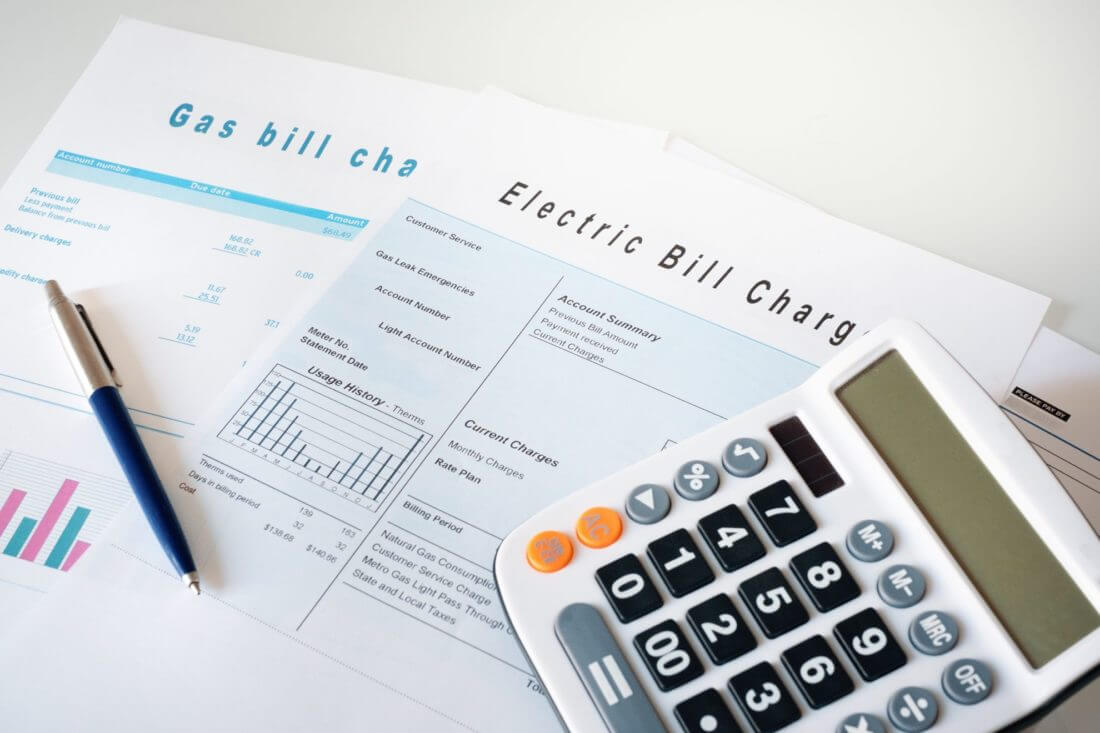Transferring apartment utilities isn’t hard but requires specific steps, from those before you move to the final touches in your new residence. We have tips and resources for simplifying the process and making it seamless. Let’s dive into the world of utility transfers, making your cross-country move as stress-free as possible.


Organizing a big move can be overwhelming, especially when booking cross-country moving services and figuring out how to get an apartment out of state. That’s why we’ve created this essential guide to help you stay on top of your utilities while relocating to your new home.
What Utilities Do Apartments Include?
When you rent an apartment, you must know which utilities come into your monthly rent and which ones you’ll be responsible for managing separately. Understanding what comes with your apartment can significantly impact your budget and help make an apartment feel like home.
Here’s a breakdown of the common utilities you may encounter and their possible inclusions in your rental agreement:
- Water and sewer – Many apartment complexes include these services in monthly rent. They’re typically metered on a building level, making it challenging to measure individual usage. However, some buildings may have individual meters.
- Electricity – While some apartments include electricity in the rent, tenants often set up an account with a local utility company. Electric utilities cover lighting, heating, cooling, and running appliances.
- Gas – Gas utilities are necessary for heating, hot water, and sometimes cooking. Like electricity, tenants can set up a private account. In some cases, gas usage may be bundled with the rent.
- Trash and recycling – Waste management services are often included in the rent and shared by all residents in an apartment complex.
- Internet and cable TV – These are generally not included in the rent; tenants are expected to set up accounts with selected service providers. Some luxury communities may offer these services as part of a package or at a discounted rate.
- Amenities – While not exactly utilities, amenities include access to a gym, pool, or clubhouse. These are often included in the rent, but you should confirm additional fees or restrictions with your landlord.
Remember, every rental agreement is unique, and the utilities included can vary significantly from one apartment to another.
Start By Researching and Preparing for Utility Transfers
When moving across the country, one of the most critical tasks is transferring utilities. The process may seem challenging, but with proper research and preparation, you can avoid hiccups.
Begin by listing all the utilities you currently have and the ones you’ll need at your new location. Then, confirm your relocation date and provide accurate information to your utility providers.
Remember to change your address with the post office and notify relevant parties, such as banks, insurance companies, and subscription services.
Research Utility Providers in the New Location
As you prepare to move away and start over in a new city or state, you should research the utility providers servicing your new area. Understanding the available options will help you make informed decisions and facilitate moving efficiently.
Compare the rates, plans, and customer reviews of different providers to determine the best fit for your needs. Additionally, check if your current providers offer services in your new location, which could simplify the transfer process.
Contact the Current Utility Providers to Arrange Transfers
Once you have gathered the necessary information, contact your current utility providers to inform them about your move. Discuss the possibility of transferring your existing accounts to your new address, and inquire about the requirements or documentation needed.
If your current providers do not offer services in your new area, you may need to close your accounts and open new ones with the local providers.
Schedule Transfer Dates for Each Utility
Coordinating utility transfers can be tricky, but scheduling transfer dates for each utility is crucial. Aim to disconnect utilities at your current residence a day after your move, allowing for any last-minute tasks. On the other hand, schedule the activation of utilities at your new apartment a day before your arrival, ensuring a smooth move-in experience.
Budget for Utility Transfer Fees
As part of your relocation budget, you must account for the costs of transferring utilities. Some providers may charge fees for transferring or activating services, while others may require security deposits for new accounts.
Knowing these costs will help you save money to move and avoid unexpected expenses. Reach out to your current and prospective utility providers to obtain accurate estimates of any fees you may incur during the transfer process.


How to Transfer Specific Apartment Utilities and What to Expect During Each Process
Transferring apartment utilities is one of the first apartment essentials to consider when moving to a new place. Understanding what to expect during each process can alleviate anxiety about moving out and ensure a seamless transition.
Here’s a step-by-step guide on transferring specific utilities.
How to Transfer Electricity
For an electricity transfer, you should:
- Contact your current provider – Notify your current electric company about your move and ask if they service your new location. If they do, ask about transferring your account.
- Research new providers (if necessary) – If your current provider doesn’t service your new area, research local electric companies and compare rates, plans, and customer reviews for the best option.
- Schedule the transfer – Once you choose a provider, schedule the disconnection at your old residence and the activation at your new one. Try to coordinate these dates with your relocation timeline.
- Provide necessary information – Be prepared to provide your new address, relocation date, and any required documentation to the electric company.
How to Transfer Water
For a water transfer, you should:
- Check if water is included in the rent – Before transferring your water service, confirm with your new landlord whether water and sewer services are included in the rent. If they are, you won’t need to transfer the service.
- Contact the water company – If water is not included in your rent, contact your current water company to inquire about transferring service or closing your account.
- Research new providers – If you need to set up a new account, research the local water companies and choose the most suitable option.
- Schedule the transfer – Coordinate the disconnection and activation dates to align with your move and provide any necessary documentation.
How to Transfer Gas
To transfer gas successfully, you’ll need to:
- Contact your current provider – Notify your current gas company about relocating and ask if they service your new location. If they do, inquire about the process for transferring your account.
- Research new providers – If your current provider doesn’t service your new area, research local gas companies and choose the best option based on rates, plans, and customer reviews.
- Schedule the transfer – Coordinate the disconnection and activation dates with your moving timeline and provide the necessary documentation.
- Arrange for a safety inspection – Some gas companies may require a safety inspection before activating service at your new residence. Arrange this inspection in advance.
How to Transfer Internet and Cable
Finally, for Internet and cable, you must follow these steps:
- Contact your current provider – Inform your current internet and cable provider about relocation and inquire about the availability of their services in your new location.
- Research new providers – If your current provider does not service your new area, research local internet and cable companies to find the best fit for your needs.
- Schedule the transfer – Coordinate the disconnection and activation dates with your move’s timeline, including providing the necessary documents.
- Plan for equipment return or transfer – If you have rented equipment from your current provider, like a modem or cable box, ask about the returning or transferring process of the equipment to your new address.
What Are Some Additional Tips for Transferring Apartment Utilities?
When planning a move to another city, transferring apartment utilities should be a top priority. To make the process as smooth as possible, consider the following tips to help you organize important papers and stay on track with other utility obligations.
Double-Check Transfer Dates
As you plan your move, it’s crucial to double-check and confirm transfer dates for each utility. Ensuring they’re disconnected from your old residence and activated at your new apartment on time will help avoid unnecessary complications and additional expenses.
Confirm Transfer Details With Utility Providers
Before your move, contact each utility provider to confirm the details of your account transfer. This includes verifying the new service address, transfer dates, and any applicable fees. Taking this step can help prevent miscommunications and last-minute surprises.
Update Mailing Addresses for Utility Bills
Organize your documents and update your mailing address with each utility provider. This ensures your bills get to your new residence and prevents late payments or penalties. Also, you may want to consider going paperless and receiving bills via email, which can help you stay organized and reduce paper clutter.
Set up Automatic Bill Payments in the New Location
To simplify your finances and reduce the risk of missing payment deadlines, consider setting up automatic utility bill payments in your new location. Do this through your bank or by using the online payment systems offered by most utility providers.
Automatic payments can help you stay on top of your bills and minimize the stress of managing multiple accounts during a move. However, pay attention to the monthly bill amounts – if you see abnormal jumps from the usual costs, you may need to follow up with your providers to see if something’s wrong.


What to Do if There are Issues With Utility Transfers?
Encountering issues with utility transfers can add to relocation stress. That’s why, if you notice discrepancies or issues with your utilities, contact the provider immediately. They may help you identify the cause of the problem and provide guidance on resolving it.
Keep a record of your communication with the provider, including names of representatives you spoke with and any reference numbers provided.
If your initial contact with the utility provider doesn’t resolve the issue, consider escalating the matter to a supervisor or manager. They may have more authority to address your concerns and can potentially expedite the resolution process.
You can also seek assistance from your landlord or property manager if you still have issues with utility transfers. They may have experience dealing with similar situations and can offer guidance or intervene with the utility provider for you.
Some cities or states have agencies or organizations that can help resolve utility disputes. Research local resources and consider reaching out for assistance if you can’t resolve the issue alone.
Another cool tip would be to meet your neighbors and ask for advice. As you make friends in a new city, don’t hesitate to ask your neighbors for advice or recommendations when dealing with utility issues. They may have faced similar challenges and can offer insights or suggestions on navigating the process.
Should you rent an apartment that includes utilities? The real estate experts in the video below explain the pros and cons of that. This wouldn’t solve your transfer issues, but it can help you decide what to do before you move.
Hire Long-Distance Movers to Handle the Moving Logistics
When planning a cross-country move, hiring a long-distance moving company can alleviate the stress and ensure your belongings are transported safely.
As you prepare for cross-country movers, it’s essential to research and compare different ones to find those that best suit your needs and budget.
Remember that the cost of movers for a 2-bedroom apartment can vary based on factors like distance, weight, and the level of service you require.
You Can Use Various Long-Distance Moving Services
Packing can be one of the most time-consuming and labor-intensive aspects of relocating. Hiring movers to provide packing services can save you time and effort and ensure your belongings are packed professionally.
Hiring movers to load and unload your belongings can reduce the risk of injury and damage to your items. Professional movers have the necessary equipment and experience to handle heavy or fragile items safely and efficiently.
By exploring the various long-distance moving services available and selecting those that best suit your needs, you can ensure a smooth and manageable relocation experience.
Moving Services
Treat yourself with a white glove long distance moving service that’s based on the inventory list and not weight. This means a price guarantee, transparent move costs and premium moving service.
Learn morePacking Service
Sit back and relax, we’ve got packing services covered. We use moving blankets, shrink wrap, bubble wrap and even custom wooden crating. Your stuff will be protected and carefully handled during the move.
Learn moreMoving Insurance
All your stuff is secure with Long Distance USA Movers, but in case something does happen to it, there’s a moving insurance policy in place. We offer both basic Valuation Coverage and Full Value Protection.
Learn moreThe List of Utilities for Apartments May Be Long, But the Time to Take Care of Them Isn’t
Relocating to a new apartment, especially when moving in together or across the country, can be overwhelming. The list of utilities to transfer or set up may seem long, but with planning and organization, you can ensure a seamless transition to your new home.
As you learn how to move, break down the tasks into manageable steps, such as researching utility providers and scheduling transfers. Moreover, partnering with a reliable company like Long Distance USA Movers can make the process easier.
With our experience and expertise, we can take care of the logistics, allowing you to focus on settling into your new home and taking care of utility transfers. Don’t let handling utilities hold you back from enjoying your new home.
Frequently Asked Questions About Apartment Utilities
What Utilities Do I Need to Transfer When Changing Apartments?
When changing apartments, you generally need to transfer essential utilities such as electricity, water, gas, internet, and cable. However, the specifics may depend on your current and new apartment arrangements.
How Do I Transfer My Electricity?
To transfer your electricity, contact your current provider to notify them about your move and ask if they service your new location. If they do, discuss the transfer process, and provide the necessary information like your new address and relocation date. If they don’t, research providers in your new area and set up an account.
How Do I Transfer My Water?
First, check if water is included in your new apartment’s rent. If not, contact your current provider to discuss transferring the service or closing your account. Research new providers and set up a new account at your new location.
How Do I Transfer My Gas?
Notify your current gas provider about relocating and ask if they service your new location. If they do, discuss the transfer process, and provide the necessary information. If they don’t, research new providers and set up a new account.
Can I Transfer My Internet and Cable When Changing Apartments?
You can transfer your internet and cable services when changing apartments if your current provider services your new location. Contact them to discuss the transfer and provide the necessary information, such as your new address and relocation date. If they don’t service your new location, research new providers.
How Much Notice Do I Need to Give My Utility Providers Before I Move?
Generally, you should give your utility providers at least two to four weeks’ notice before leaving. However, check with each provider to determine their specific notice requirements.
What Happens if I Forget to Transfer My Utilities Before I Move?
If you forget to transfer your utilities, you may face service interruptions or additional fees. Contact your utility providers when you realize the oversight to expedite the transfer process and minimize potential issues.
Do I Need to Contact My Current Utility Providers to Cancel Services?
You should contact your current utility providers to cancel services if you aren’t transferring your accounts to your new location. This ensures you won’t be billed for services you no longer use.
What Should I Do In Case of Utility Billing or Service Issues During the Transfer?
If you encounter billing or service issues during the transfer process, contact the relevant utility provider to discuss the issue and seek a resolution. Be prepared to provide details and relevant account information.
Can I Transfer My Utilities to Someone Else if I Am Not the Account Holder?
Generally, you can’t transfer utilities directly if you’re not the account holder. The account holder should initiate the transfer process or designate you as an authorized user to handle the transfer on their behalf. Check with each utility provider to determine their specific requirements and procedures.







